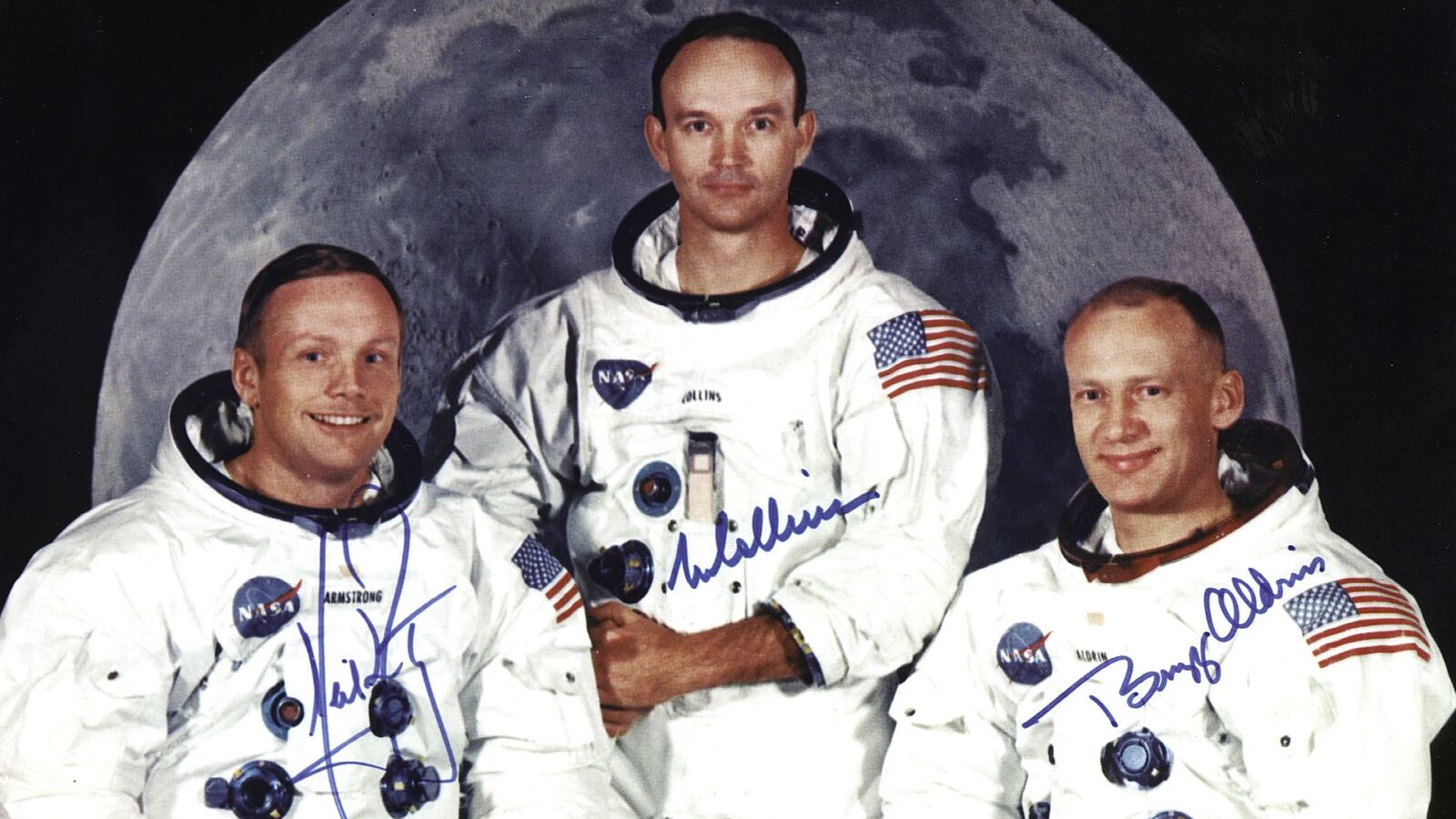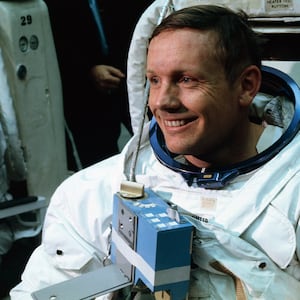By now many Americans have forgotten that astronauts Neil Armstrong and Buzz Aldrin weren’t alone as they took humankind’s first steps on the surface of the moon on July 20, 1969.
Orbiting some 60 miles overhead in the Apollo 11 command module, 38-year-old Michael Collins enjoyed a brief moment of peace and quiet as the module passed around the dark side of the moon, cutting off all communication with Earth.
“It was a wonderful experience,” Collins said in 2016. “The fact that it was quiet—silent, utterly—was good, not bad. It gave me some time off of mission control telling me to do this and that.”
That contentment and calm—in stark contrast to the late Armstrong’s stalwart statesmanship and Aldrin’s romantic volatility—defined Collins’ long life. The man who shepherded the first two men to stand on the moon died on April 28 at the age of 90.

Astronaut Michael Collins prepares to board for the beginning of the Apollo 11 mission to the moon on July 16, 1969.
NASAMichael Collins was born in Rome, on Halloween 1930. His father was career U.S. Army officer James Lawton Collins, who would eventually fight in three wars. His mother, Virginia Collins, née Stewart, was an educated woman who traced her lineage in America to the years before the Revolutionary War.
Graduating high school in 1948, the boy followed in his father’s footsteps and enrolled in the U.S. Military Academy at West Point. He became a fighter pilot flying F-86 jets. In 1956, he was forced to eject from his plane after it burst into flames over France. “It was 10 percent shrewd planning and 90 percent blind luck” that he survived his flying career, Collins said later. “Put ‘lucky’ on my tombstone.”
Collins met his future wife, Patricia Finnegan, the daughter of a Massachusetts state senator, at an Air Force club. They married in 1957 and had three children. While serving as a test pilot in 1962, Collins applied to be an astronaut. NASA rejected him. “It ain’t pleasant,” he later said of his early failure.
He applied to NASA again in 1963. This time, the space agency said yes.
On July 18, 1966, Collins and astronaut John W. Young launched into Earth’s orbit aboard the Gemini 10 mission—America’s 16th manned spaceflight. Collins completed his first, modest spacewalk, briefly standing in the open hatch of the capsule in order to take photos.
The brief spacewalk shaped his future in ways Collins might not have appreciated at the time. NASA decided that for the Apollo 11 mission, the pilot of the command module should have “extravehicular” experience. Collins would have to stay in the module while Armstrong and Aldrin descended to the lunar surface.
Before liftoff from Cape Canaveral, Collins’ wife penned him a poem. “Take my silence, though intended,” she wrote. “Fill it with the joy you feel. Take my courage, now pretended—you, my love, will make it real.”

President Richard Nixon and the Apollo 11 astronauts exchange “A-OK” signs through the window of the Mobile Quarantine Facility on July 25, 1969, aboard the USS Hornet. Astronauts (L-R) Neil Armstrong, Michael Collins, and Buzz Aldrin splashed down in the Pacific Ocean on July 24, 900 miles southwest of Hawaii at the completion of their successful lunar landing mission.
NASA/AFP/GettyOrbiting in the darkness and silence while Aldrin and Armstrong were cementing their future fame, Collins reflected on the planet he’d left behind. “I really believe that if the political leaders of the world could see their planet from a distance of 100,000 miles, their outlook could be fundamentally changed,” he said decades later.
“That all-important border would be invisible, that noisy argument silenced. The tiny globe would continue to turn, serenely ignoring its subdivisions, presenting a unified façade that would cry out for unified understanding, for homogeneous treatment. The Earth must become as it appears: blue and white, not capitalist or communist; blue and white, not rich or poor; blue and white, not envious or envied.”
“Small, shiny, serene, blue and white. Fragile.”

The crew of the Apollo 11 lunar landing mission gives a press conference on July 19, 1969.
AFP/GettyReturning to Earth, Collins spent a year working for the State Department before retiring from NASA, and public life, in 1970. He oversaw the National Air and Space Museum from 1971 to 1978 and worked for LTV Aerospace for five years, resigning in 1985 to found his own consulting firm.
Collins wrote four books, but he never aspired to national politics like Armstrong did or pop-culture fame like Aldrin did. He and Patricia settled into a quiet retirement in the Everglades. Patricia died in 2014.
The widower and former astronaut stayed busy running, painting, and playing the stock market. “I’m a good retiree in that I have a lot of hobbies,” Collins said in 2016. He advocated on behalf of NASA for a mission to Mars but otherwise avoided the spotlight.
“Some things about current society irritate me, such as the adulation of celebrities and the inflation of heroism,” Collins said in 2009. “Heroes abound, and should be revered as such, but don’t count astronauts among them. We work very hard. We did our jobs to near perfection, but that was what we had hired on to do.”







